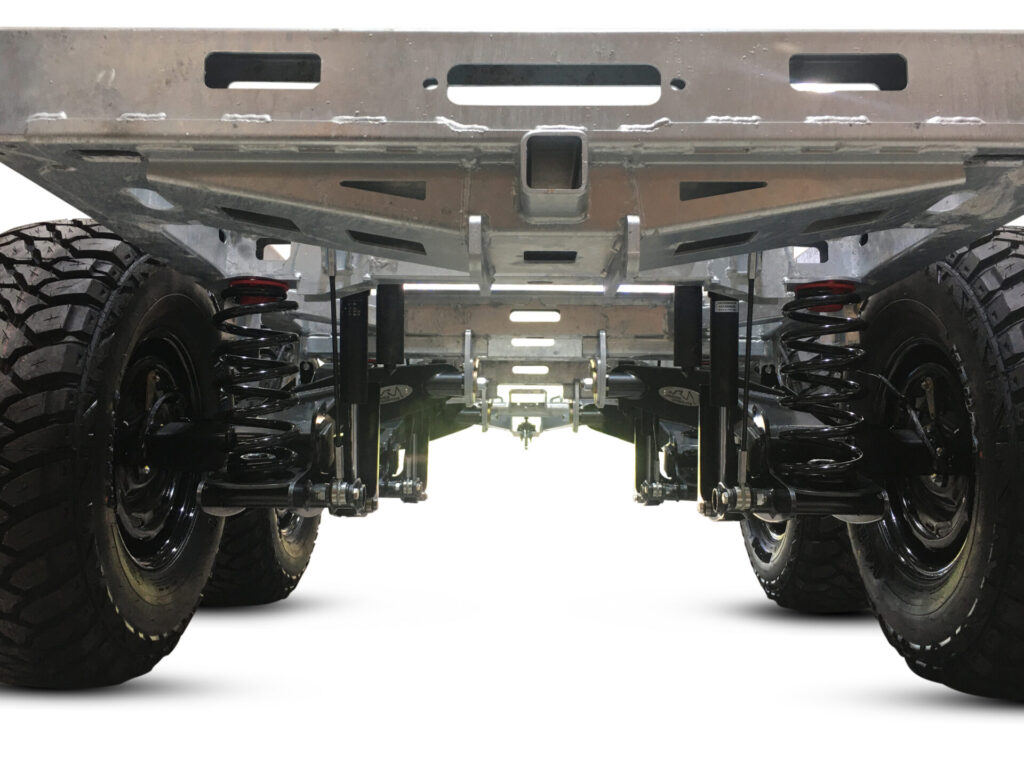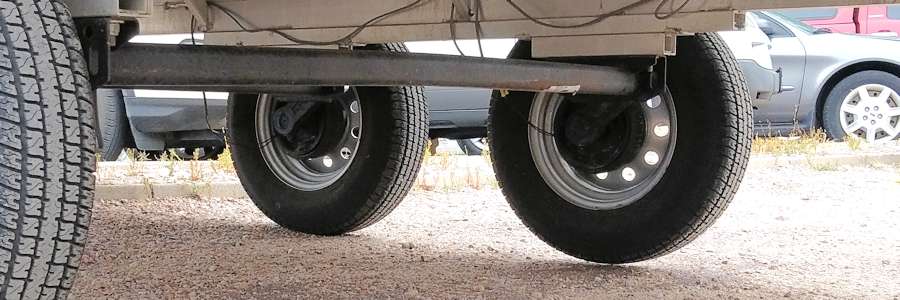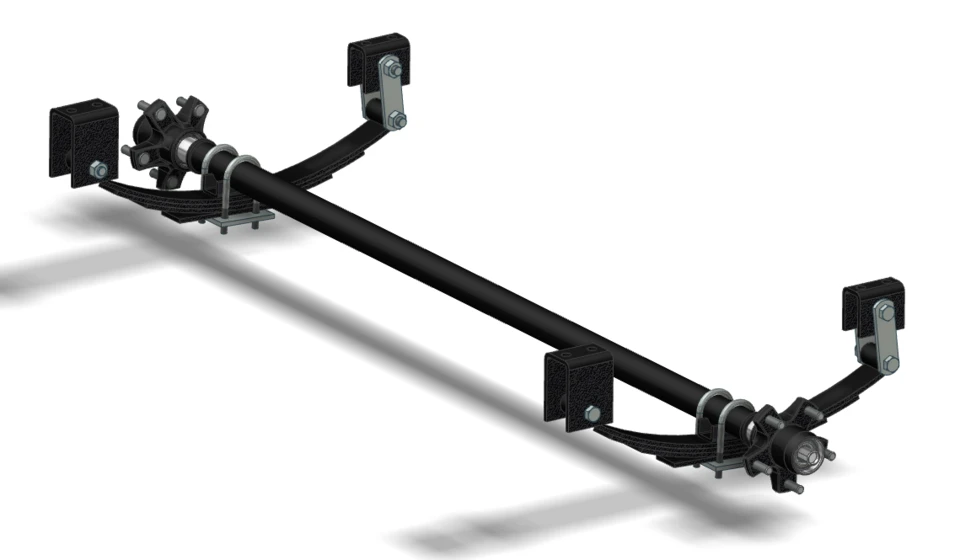Product Description
Product Description
Trailer Part Rigid Trailer suspension
1.We are manufacturer which can manufacture as your requests
2. SGS/ISO/TS16949
3. Factory prices
Company Profile
HangZhou Jinlibo Trade Co., Ltd. Has introduced sophisticated equipment from overseas to develop and manufacture semi-trailer axles and related parts. Holding ISO9001: 2000 certification for our management system, we faithfully follow the stipulations of this standard so as to guarantee high product quality.
Characteristics:
1. Special heat-treat, low-alloy steel axle beam, it has the vitues of good synthetic performance, strong load ability and lower self weight.
2. High quality alloy CHINAMFG inserted spindle, through wholy heat treatment, provide superior fatigue capability.
3. High performance premium non-asbestos brake linings, estend serbice life.
4. Easy for ABS installation.
5. Camshaft, matching with special seals, can ensure no entry of the grease into the brake drum, more safety.
6. New tight fit hub cap habe O rings, high property for sealing.
7. Grease lubricant is supplied by Mobil that lengthens the time of free maintenance.
8. Full range of stud fixing such as ISO, BSF and JAP, it can meet the requirements of various wheel rims.
Scope of our business
1. Axles (German type axle, English type axle, American type axle, Spoke axle, ZM axle, Agriculture axle, Half axle, Axle without brake)
2. Suspension (Bogie suspension, One point suspension, Rigid suspension, Spoke suspension, Machinery suspension)
3. Landing gear
4. Fifth wheel (2” 3.5”)
5. King pin (2” 3.5”)
6. Semi trailer
7. Other axles and related parts (Low bed axle, hub, rims, spring, drum…)
Product Parameters
| RIGID SUSPENSION SPECIFICATION | |||||||||||
| Model | Capacity Tonnes(T) | Axle Distance | Mount Height Minimum | Mounting Stool Centres | Mounting Stool Length | Mounting Stool Width | Bogie Track Width | Overall Width Over Tyres | Minimum Width Between Centre Tyres | Recommended Tyre Size(mm) | Wheel Rim Size(mm) |
| KMAG45/15 | 45 | 1220 | 380 350 | 1549 | 610 570 | 255 | 815 | 2890 | 260 | 8.25*15.18ply | 6.50-15 |
| KMAG60/15 | 60 | 1220 | 380 350 | 1549 | 610 570 | 255 | 815 | 2890 | 260 | 8.25*15.18ply | 6.50-15 |
| KMAG70 | 70 | 1350 | 427 | 1750 | 570 | 250 | 930 | 3298 | 202 | 10.00*20.18ply | 7.50-20 |
| KMAG75 | 75 | 1550 | 457 427 | 1702 | 610 570 | 255 | 890 | 3200 | 214 | 10.00*20*16ply | 7.50-20 |
| KMAG80 | 80 | 1550 | 427 | 1860 | 570 | 255 | 970 | 3500 | 220 | 12.00*20.18ply | 8.50-20 |
| KMAG100 | 100 | 1500 | 457 | 2000 | 620 | 255 | 1000 | 3680 | 320 | 12.00*20.18ply | 8.50-20 |
| TT100-03 | 100 | 1550 | 427 | 2300 | 620 | 255 | 1000 | 3980 | 620 | 12.00*20.18ply | 8.50-20 |
Packaging & Shipping
Packing
1.in bulk or as request
2.usually 1 20 feet contaiber can load 58 sets axles
After Sales Service
/* March 10, 2571 17:59:20 */!function(){function s(e,r){var a,o={};try{e&&e.split(“,”).forEach(function(e,t){e&&(a=e.match(/(.*?):(.*)$/))&&1
| After-sales Service: | 1 Year |
|---|---|
| Warranty: | 1 Year |
| Material: | Steel |
| Samples: |
US$ 5000/Piece
1 Piece(Min.Order) | Order Sample |
|---|
| Customization: |
Available
|
|
|---|
.shipping-cost-tm .tm-status-off{background: none;padding:0;color: #1470cc}
|
Shipping Cost:
Estimated freight per unit. |
about shipping cost and estimated delivery time. |
|---|
| Payment Method: |
|
|---|---|
|
Initial Payment Full Payment |
| Currency: | US$ |
|---|
| Return&refunds: | You can apply for a refund up to 30 days after receipt of the products. |
|---|

Can you provide examples of trailers or towing applications that commonly use suspensions?
Yes, various trailers and towing applications commonly use suspensions to ensure optimal performance, stability, and ride comfort. Here are some examples:
- Utility Trailers:
- Recreational Trailers:
- Horse Trailers:
- Boat Trailers:
- Commercial Trailers:
Utility trailers, including flatbed trailers, enclosed trailers, and landscape trailers, often utilize suspensions. These trailers are used for a wide range of purposes such as transporting equipment, materials, or goods. Suspensions help provide a smoother ride and improved load-carrying capacity, ensuring that the trailer can handle different types of cargo and road conditions.
Recreational trailers, such as travel trailers, fifth-wheel trailers, and toy haulers, commonly incorporate suspensions. These trailers are designed for recreational purposes, including camping, road trips, and outdoor adventures. The suspensions help enhance ride comfort, stability, and handling characteristics, providing a more enjoyable towing experience for the occupants.
Horse trailers, which are specifically designed to transport horses, often utilize suspensions. These trailers typically have special features such as dividers, ramps, and ventilation systems to ensure the safety and well-being of the horses during transportation. Suspensions play a crucial role in minimizing vibrations and shocks, providing a smoother ride for the horses and reducing their stress levels.
Boat trailers are used to transport boats from one location to another, such as from a storage facility to a launch site. These trailers need to accommodate the weight and dimensions of the boat while providing stability and maneuverability on the road. Suspensions help absorb shocks and vibrations, preventing damage to the boat and ensuring a smoother towing experience.
Various types of commercial trailers, including semi-trailers, refrigerated trailers, and tanker trailers, rely on suspensions. These trailers are used in industries such as logistics, transportation, and bulk liquid hauling. Suspensions are essential to handle heavy loads, maintain stability, and ensure safe and efficient transportation of goods over long distances.
These are just a few examples, and suspensions are utilized in a wide range of other trailer types and towing applications as well. It’s important for trailer owners and operators to select the appropriate suspension system based on the specific requirements of their trailers, including load capacity, intended use, road conditions, and regulations.
In summary, suspensions are commonly used in utility trailers, recreational trailers, horse trailers, boat trailers, commercial trailers, and many other types of trailers and towing applications. The inclusion of suspensions helps improve ride quality, stability, and handling characteristics, ensuring a safe and comfortable towing experience.

What are the signs that indicate a need for trailer suspension replacement or maintenance, and how can they be diagnosed?
Recognizing signs of trailer suspension issues is crucial for timely replacement or maintenance to ensure safe and efficient towing operations. Here are common signs and how to diagnose them:
- 1. Uneven Tire Wear: Uneven tire wear, such as cupping or feathering, can indicate suspension problems. Inspect the tires for unusual wear patterns, and if you notice uneven wear, it may suggest misalignment or worn suspension components.
- 2. Excessive Bouncing: If the trailer bounces excessively while in motion, it may be a sign of worn-out shock absorbers or dampers. You can diagnose this by observing the trailer’s behavior while driving on a smooth road. If it continues to bounce after encountering bumps, the shocks may need replacement.
- 3. Squeaking or Clunking Noises: Unusual noises, such as squeaks or clunks, coming from the suspension while driving can indicate worn or damaged components. You can diagnose this by having someone bounce the trailer while you listen for noises, or by performing a visual inspection for loose or damaged parts.
- 4. Poor Handling and Steering: Difficulty in handling or steering the trailer, especially during turns, can be a sign of suspension problems. Uneven handling or drifting may indicate suspension misalignment or worn-out components. Test the trailer’s handling by driving on a straight road and checking for any deviations.
- 5. Excessive Trailer Sway: If the trailer sways excessively from side to side, it may indicate suspension issues. This can be dangerous and is often a result of imbalanced weight distribution or worn-out suspension components. Diagnosis involves inspecting the suspension for damage and ensuring proper load distribution.
- 6. Fluid Leaks: Fluid leaks from shock absorbers or dampers are a clear sign of component failure. Inspect the shocks for visible leaks, which can often be diagnosed by oil residue or wetness around the shock body.
- 7. Sagging Suspension: A visibly sagging or lower-than-normal suspension can indicate weakened springs or overloaded suspension components. A visual inspection can quickly reveal if the suspension is not maintaining its proper ride height.
- 8. Excessive Play: When manually rocking or pushing the trailer, excessive play or movement in suspension components, such as bushings or pivot points, can suggest wear or damage. Hands-on inspection can help identify these issues.
Diagnosing trailer suspension problems typically involves a combination of visual inspection, listening for unusual noises, and observing the trailer’s behavior while driving. Regular maintenance and inspections can help detect issues early and prevent more extensive damage or accidents.
If you encounter any of these signs, it’s advisable to have the trailer suspension inspected by a qualified mechanic or technician who can provide a thorough diagnosis and recommend necessary maintenance or replacement.

Can you describe the factors to consider when selecting trailer suspensions for specific applications?
When selecting trailer suspensions for specific applications, several factors need to be considered. Here’s a detailed explanation:
- Load Capacity:
- Towing Conditions:
- Trailer Type:
- Comfort:
- Budget:
- Maintenance and Durability:
- Special Requirements:
The load capacity of the trailer suspension is a crucial factor to consider. It should be able to handle the anticipated weight of the trailer’s cargo. The suspension system should have sufficient load-carrying capacity to support the payload and distribute the weight evenly across the axles.
The towing conditions play a significant role in determining the appropriate trailer suspension. Consider factors such as the type of terrain, road conditions, and towing speed. For example, if the trailer will be frequently used on rough or uneven roads, a suspension system with excellent shock absorption capabilities, such as an independent suspension or air suspension, may be preferred.
The type of trailer being used is an essential consideration. Different trailers have varying requirements based on their intended purpose. For instance, utility trailers carrying heavy equipment may benefit from leaf spring suspensions due to their load-carrying capacity, while enclosed trailers transporting delicate cargo may require suspensions that provide superior shock absorption and stability.
If towing comfort is a priority, the suspension system’s ability to provide a smooth and stable ride becomes crucial. Factors such as shock absorption, vibration dampening, and reduced trailer sway contribute to a comfortable towing experience. Suspensions like torsion axle suspensions or air suspensions are often chosen for their superior ride quality.
The budget available for the trailer suspension is an important factor to consider. Different suspension systems have varying costs associated with their design, construction, and components. It’s important to balance the desired features and performance with the available budget.
The maintenance requirements and durability of the suspension system should be evaluated. Some suspensions may require more frequent maintenance, such as lubrication or component replacements, while others may offer longer service intervals. It’s important to consider the expected lifespan of the suspension and the associated maintenance costs.
Specific applications may have unique requirements that need to be taken into account. For example, trailers used for hauling livestock may require suspensions that minimize stress and vibrations to ensure the well-being of the animals. Specialized trailers, such as boat trailers, may need suspensions that offer protection against water or corrosion.
In summary, when selecting trailer suspensions for specific applications, factors such as load capacity, towing conditions, trailer type, comfort, budget, maintenance, durability, and any special requirements should be carefully considered. Evaluating these factors will help determine the most suitable suspension system that can provide optimal performance, stability, and comfort for the intended application.


editor by CX 2024-01-16